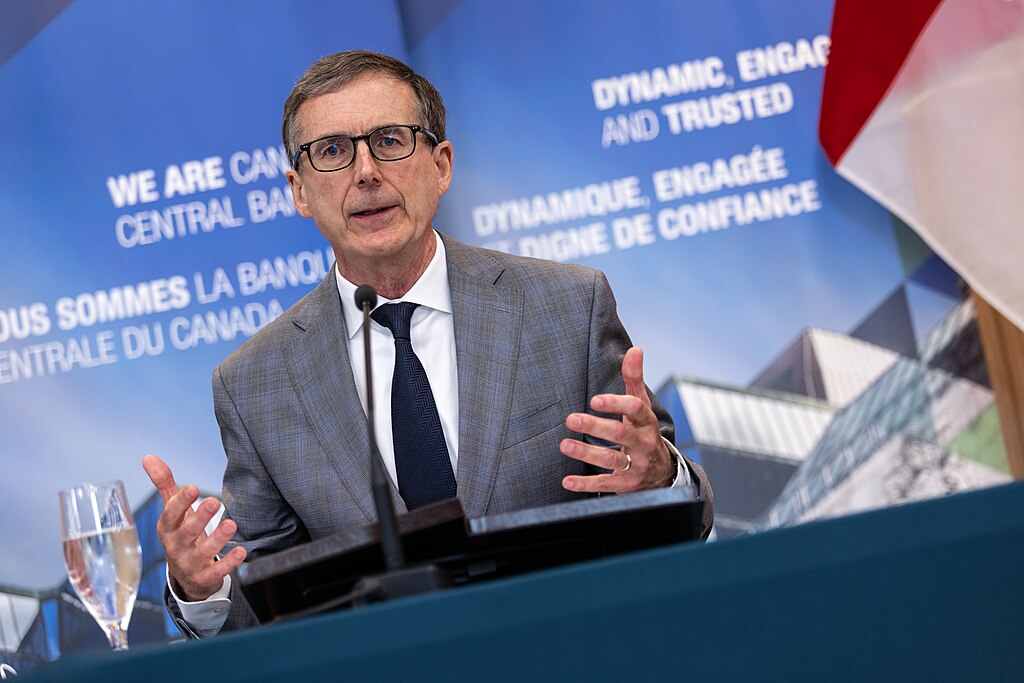Bank of Canada Governor Tiff Macklem warned that U.S. policy shifts and President Donald Trump’s tariff threats are creating economic uncertainty. Speaking at a virtual conference in Mexico City, Macklem noted that the mere threat of new tariffs is already impacting business and household confidence, particularly in Canada and Mexico.
On Monday, Trump temporarily paused a planned 25% tariff on nearly all Canadian and Mexican imports. Had the tariff been implemented, it could have triggered a recession and increased prices in both countries. However, the U.S. government has only suspended the tariffs for a month, leaving long-term uncertainty.
Macklem emphasized that prolonged uncertainty will slow economic activity and complicate monetary policy. The Bank of Canada previously warned that such tariffs make economic projections difficult and could cause severe economic harm. If broad-based tariffs are imposed, long-term prosperity would decline, a situation monetary policy cannot easily fix.
Beyond tariffs, Macklem pointed to other global challenges, including geopolitical risks, rising trade protectionism, economic fragmentation, technological advancements, and climate-related disruptions. These structural changes create additional hurdles for central banks, forcing them to make tougher policy decisions while facing increased scrutiny.
"We will be criticized for being ineffective or not doing enough, and our independence may be challenged," Macklem said. The Bank of Canada has faced criticism for its pandemic-era policies, which some believe failed to curb recession and unemployment. In response, the bank pledged to improve communication and forecasting to better predict future economic shocks.
Amid growing uncertainty, Macklem stressed that central banks must remain evidence-based, independent, and professional, working collaboratively to maintain price stability and economic resilience.



 Trump Signs Executive Order Threatening 25% Tariffs on Countries Trading With Iran
Trump Signs Executive Order Threatening 25% Tariffs on Countries Trading With Iran  U.S.-India Trade Framework Signals Major Shift in Tariffs, Energy, and Supply Chains
U.S.-India Trade Framework Signals Major Shift in Tariffs, Energy, and Supply Chains  RBA Raises Interest Rates by 25 Basis Points as Inflation Pressures Persist
RBA Raises Interest Rates by 25 Basis Points as Inflation Pressures Persist  BOJ Rate Decision in Focus as Yen Weakness and Inflation Shape Market Outlook
BOJ Rate Decision in Focus as Yen Weakness and Inflation Shape Market Outlook  Jerome Powell Attends Supreme Court Hearing on Trump Effort to Fire Fed Governor, Calling It Historic
Jerome Powell Attends Supreme Court Hearing on Trump Effort to Fire Fed Governor, Calling It Historic  Vietnam’s Trade Surplus With US Jumps as Exports Surge and China Imports Hit Record
Vietnam’s Trade Surplus With US Jumps as Exports Surge and China Imports Hit Record  Dollar Near Two-Week High as Stock Rout, AI Concerns and Global Events Drive Market Volatility
Dollar Near Two-Week High as Stock Rout, AI Concerns and Global Events Drive Market Volatility  Fed Governor Lisa Cook Warns Inflation Risks Remain as Rates Stay Steady
Fed Governor Lisa Cook Warns Inflation Risks Remain as Rates Stay Steady  Oil Prices Slide on US-Iran Talks, Dollar Strength and Profit-Taking Pressure
Oil Prices Slide on US-Iran Talks, Dollar Strength and Profit-Taking Pressure  Japanese Pharmaceutical Stocks Slide as TrumpRx.gov Launch Sparks Market Concerns
Japanese Pharmaceutical Stocks Slide as TrumpRx.gov Launch Sparks Market Concerns  China Extends Gold Buying Streak as Reserves Surge Despite Volatile Prices
China Extends Gold Buying Streak as Reserves Surge Despite Volatile Prices  South Korea Assures U.S. on Trade Deal Commitments Amid Tariff Concerns
South Korea Assures U.S. on Trade Deal Commitments Amid Tariff Concerns  Trump Endorses Japan’s Sanae Takaichi Ahead of Crucial Election Amid Market and China Tensions
Trump Endorses Japan’s Sanae Takaichi Ahead of Crucial Election Amid Market and China Tensions 































